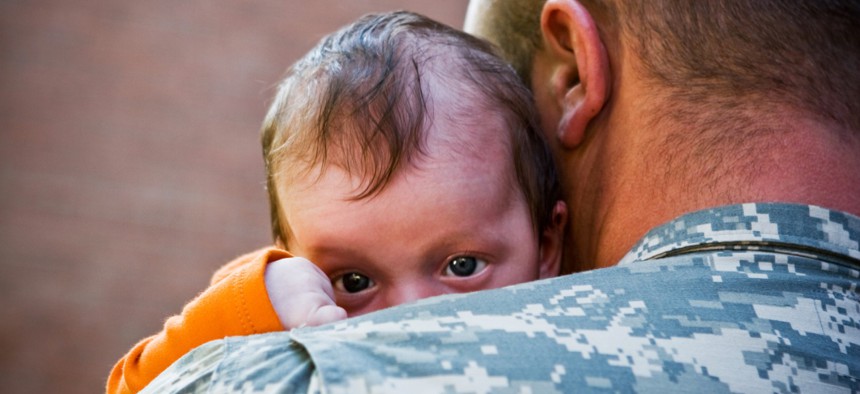
spfoto / istock
Bipartisan Bill Would Extend Feds’ Paid Parental Leave to Military Troops
Legislation would provide service members with 12 weeks of paid parental leave per year and would extend the benefit to scenarios involving miscarriages and stillbirths.
A bipartisan group of lawmakers this week introduced a bill that would extend to military service members the recently implemented paid parental leave program available to federal employees.
On Tuesday, Reps. Jackie Speier, D-Calif., Stephanie Bice, R-Okla., Carolyn Maloney, D-N.Y., and David Joyce, R-Ohio, introduced the Servicemember Parental Leave Equity Act, which would grant members of the armed services 12 weeks per year of paid leave in the event of the birth, adoption or foster placement of a child. The program mirrors a similar benefit provided to civilian federal workers as part of the 2020 National Defense Authorization Act. Sen. Tammy Duckworth, D-Ill., has sponsored similar legislation in the Senate.
Currently, depending on the service branch, new parents have a much smaller amount of paid leave available to them after welcoming a new child to their family. In the case of the U.S. Navy and Marine Corps, so-called “secondary caregivers” only have access to two weeks of paid parental leave.
The bill also would provide an additional scenario when service members can access the leave: in the event of a miscarriage, stillbirth or infant death, and it would allow service members to take leave in multiple increments. Additionally, it would expand the existing policy allowing service members to defer active duty deployment for 12 months following childbirth to include overnight travel, physically demanding training exercises, body composition standards, and the physical fitness test.
“Parental leave for military service members is absurdly out of touch and outdated when compared to federal benefits and options provided by many private, large employers,” Speier said in a statement. “New parents need time to bond with their children after birth, adoption or foster placement; service members are no exception.”
Bice said in a statement that it’s important that there be a parity in benefits between the civilian federal workforce and the military service branches.
“Our service members and their families have earned this modernization of military parental leave policies and with this change, their benefits would be in line with federal employees, who were also granted 12 weeks of parental leave in the fiscal 2020 NDAA,” Bice said. “Allowing military families the time to experience those first critical months as a new family is incredibly important, and the flexibility for the secondary caregiver to take their leave in more than one increment is especially helpful to service members who may be deployed.”
Organizations representing service members and women in the military quickly endorsed the legislation.
“While expanding one’s family brings joy and challenges alike, military families continue to serve at home and abroad as the mission requires,” said Besa Pinchotti, acting executive director of the National Military Family Association. “NMFA is proud to support the Servicemember Parental Leave Equity Act as it increases flexibility and support to military families who welcome new additions through birth, adoption or foster care.”
“This is a powerful step to close the gaps in the Military Parental Leave Program and to ensure that service members are all provided universal 12 weeks of parental leave, regardless of how they become parents,” said Krystle Wallace, executive director of Mom2Mom DBA Global and Breastfeeding in Combat Boots. “This paid family leave is critical for the physical, mental and psychological health and well-being of military families welcoming in new family members. In addition, we believe this will bolster military recruitment, readiness and retention.”







